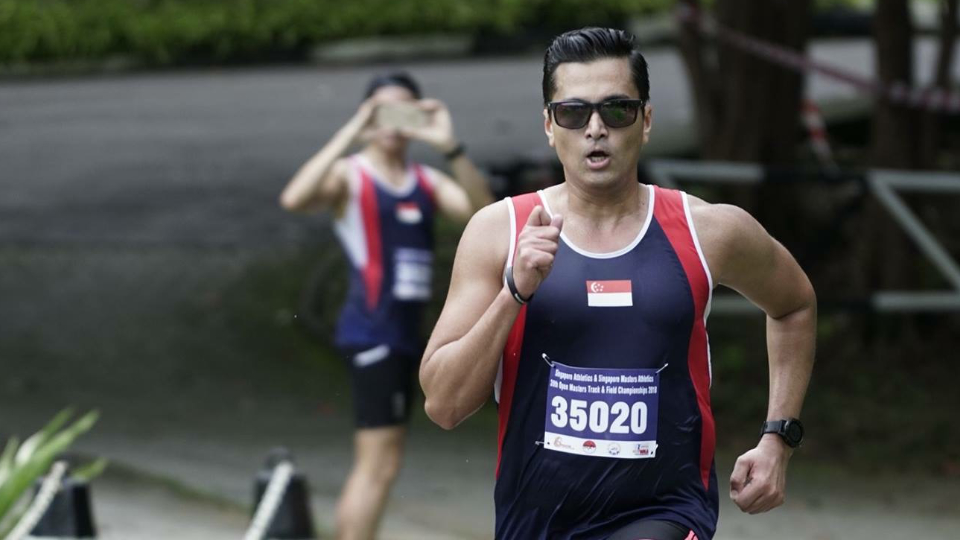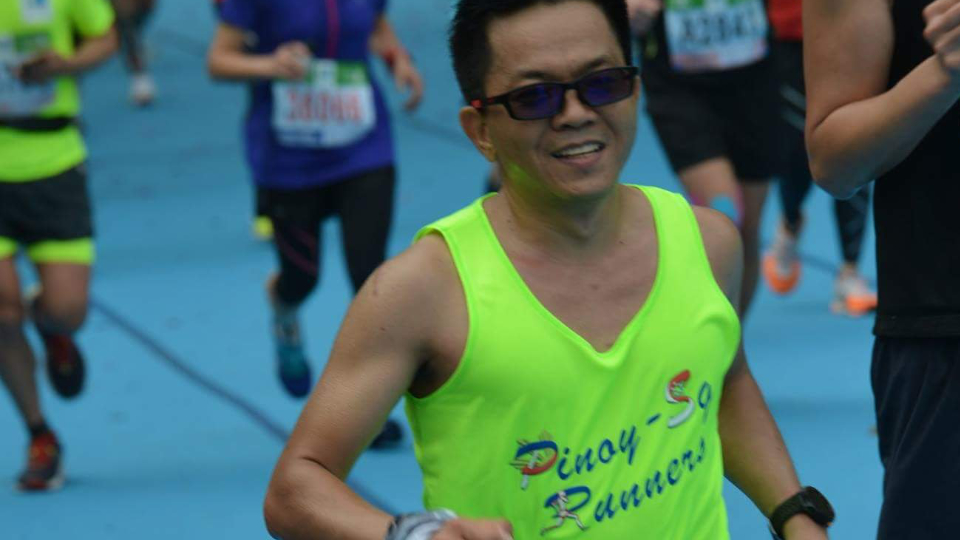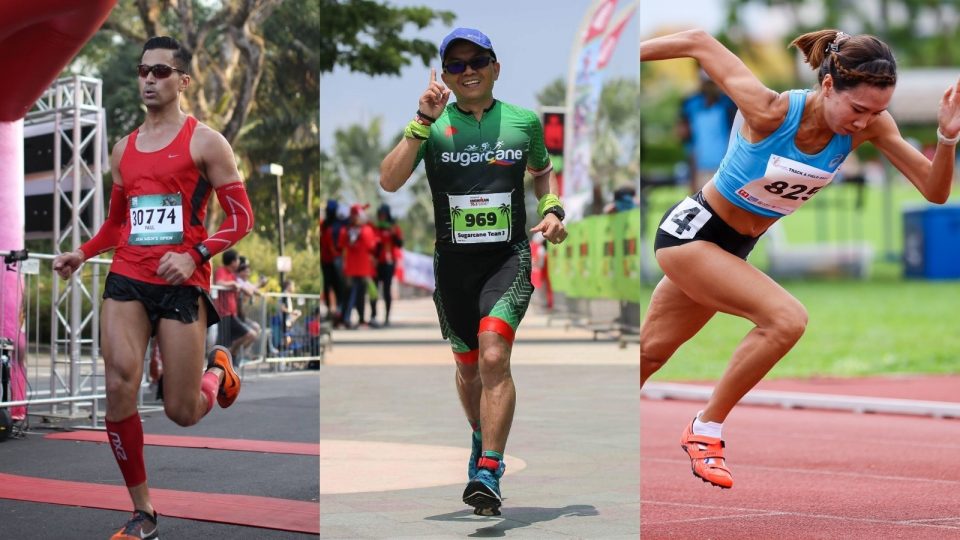After racing a marathon, ultra-marathon or any other running races, recovery and resting is a must for every runner.
Do not neglect your recovery process and move forward to the next race, as this will take a toll by depleting your glycogen, breaking down muscle fibres, making your body fatigued, and there is a higher risk of getting running injuries (which you do not want to happen).
To make sure that you are fully recharged to run your next race, we have collected a few recovery tips from our community runners about post-run recovery.
Use these tips to make the most of your post-run recovery.
1. Paul Martin
Bio: Singaporean, 40-year-old, Flight Attendant

Paul has been a casual runner since his army days until he had a podium position at a company race about 9 years ago. He also got recruited to do track and field races.
During that time, he met Coach Ghana, who currently still coaches him. Under his tutelage, he has achieved all of his targeted race paces for the 5k, 10k, 21km and 42km.
Currently, he holds the position of Vice Captain for the company’s track and field team and is an active member of the Voltrunners Sg.
RS: How do you recognise post-run proper recovery?
Paul: Post-run recovery is essential, whether it’s a short hard sprint or a super long run. Your body needs to recover to absorb the work that you have done.
Consistent training is an important factor if you’re looking to improve your running. And to be consistent, adequate recovery is the key. There’s also a saying that you can only train as hard as you can recover.
RS: What is the best advice or tip to share with new runners for post-run recovery?
Paul: Hydrate as soon as you finish the run and always stretch or foam roll after a run. Most runners neglect this essential part of running.
And if you had a hard workout, a very slow recovery run usually helps speed up the recovery process. Consuming your recovery drink or protein within 30 minutes after your workout also helps.
You can follow Paul on Instagram: @metro_paul
2. Noel Bautista
Bio: Filipino, 47-year-old, Accountant

Noel started running in 2013 to lose weight, improve health, and try something new. Noel also enjoys running with a group and sees it as a great way to meet friends and develop a sense of community.
Running for something worthwhile keeps his stay motivated and makes his races even more meaningful and fulfilling.
Thus, he has participated in several pacing duties and charity runs to raise funds and bring awareness to charitable institutions. Currently, he’s an active member and one of the admins of Pinoy-Sg Runners.
RS: How do you recognise post-run proper recovery?
Noel: Whether it’s a short run or long distance race, I always recognise the importance of proper recovery. It helps me perform at my best on my next run and will also make me stronger and faster.
When we run, our muscles and tissues are temporarily damaged, and our body and mind are fatigued and may crave a proper rest to restore their natural balance. Aside from that, our body gets dehydrated, and energy tanks are depleted.
Thus, post-run proper recovery is about achieving the repair of our muscles and tissues, resting our mind and body, replenishing the energy stores and ensuring we come back stronger on our next run.
RS: What is the best advice or tip to share with new runners for post-run recovery?
Noel: Proper nutrition and hydration can help prevent soreness after a run and help me build muscle faster than before. I will make sure to drink plenty of water or sports drinks to regulate my body temperature and blood pressure and transport energy and nutrients throughout the body.
I also make sure to eat foods that are rich in complex carbohydrates plus high-quality protein to help repair and rebuild my muscles.
I will perform cool down exercises at least 15 to 20 minutes at the end of every run to ease myself out of strenuous activity.
It lowers the chance of injury, promotes blood flow, and reduces stress to our heart and other muscles. In addition, it also brings the heart rate, body temperature, and blood pressure levels back down to their normal levels.
A good night’s sleep is required after a long hard run or race, as our body needs time to recover and repair itself. I make it a habit of going to bed and sleeping at least eight hours after every long run.
Taking an ice bath after a long run is also my way to deal with muscle inflammation and soreness. If I have the luxury to get a good massage after the race, I also do it.
Massage is an effective way to help reduce muscle tension, soreness and prevent injury.
You can follow Noel on Instagram: @nature_run_shoot
3. Goh Chui Ling
Bio: Singaporean, 28 years old, Doctoral Researcher (Sports Law and Governance)

Chui Ling is a national middle-distance runner for Singapore and has competed in multiple SEA Games and other major competitions like the Asian Games and Asian Athletics Championships.
She started her competition distance running in 2017 before she was a national sprinter and high jumper. She has won multiple road races, even though she prefers track racing.
She ranked as the top Singapore athlete for track events in 2021 – 400m (56.72), 800m (2:11.61), 1500m (4:32.3), 5000m (17:55), as well as 2.4 km on the road, where she clocked 8:06 in early 2021.
RS: How do you recognise post-run proper recovery?
Chui Ling: For me, post-run recovery consists of immediate hydration (water and electrolytes if I have lost too much water during the run), a recovery drink within 15 minutes (which contains carbohydrate, protein, creatine), and a good and full post-run meal (balanced diet).
As I clock 8-10 sessions of training a week, there is a dire need for good recovery; if not, my body would not be able to sustain the load. Apart from nutritional intake, I also try to go for recovery sessions, such as physiotherapy, chiropractic adjustments, sports massages.
But, in general, I also know how to maintain my body myself by using other strategies, such as icing, hot-cold showers, and using a good acupressure ball/roller.
RS: What is the best advice or tip to share with new runners for post-run recovery?
Chui Ling: Never neglect your body after a hard workout! I have learnt that the hard way, having struggled through sessions and loading without optimal recovery.
There is often no need to put our bodies through unnecessary stress, such as body aches and injuries.
My best advice is preparation – always think about what you are going to ingest before your run, whether it is to have some cash in your pocket to buy a drink or having some drink on hand to gulp down after the session.
You can follow Chui Ling on Instagram: @gohchuiling
Feel free to share your tips and tricks on how to recover faster to our fellow runners.





